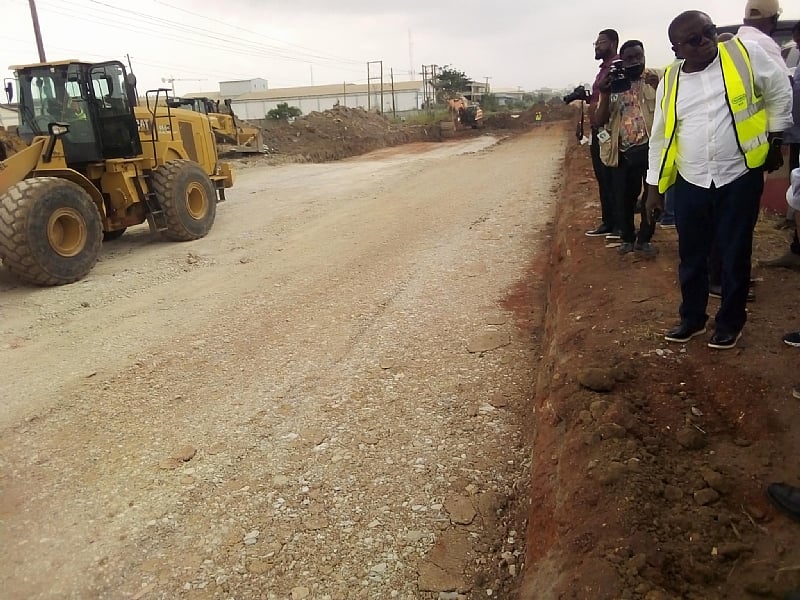Ghana’s Parliament has allocated a substantial GHS 2.8 billion for road maintenance in the current fiscal year, a crucial investment aimed at improving the country’s transportation infrastructure and facilitating the efficient movement of goods and services. This commitment underscores the government’s recognition of the vital role that well-maintained roads play in economic development, enabling businesses to access markets, boosting trade, and connecting communities. The allocation also signifies a dedication to addressing the existing backlog of road maintenance needs, as evidenced by the fact that 43% of Ghana’s roads underwent maintenance activities, including reshaping, gravelling, and pothole patching, in the previous year. This proactive approach seeks to enhance road safety, reduce travel times, and minimize vehicle wear and tear, ultimately benefiting both individuals and businesses across the country.
Isaac Adjei Mensah, Chairman of Parliament’s Roads and Transport Committee, highlighted the significance of this investment, positioning it as a key component of the government’s “resetting agenda.” This agenda likely reflects a broader strategy to revitalize various sectors of the economy, with road infrastructure being a priority area given its interconnectedness with other sectors. Mr. Mensah acknowledged the substantial debt burden inherited by the current administration, citing a GHS 105 billion debt stock and a further GHS 109 billion in commitments to road contractors. This financial context underscores the government’s commitment to prioritizing road maintenance despite these fiscal challenges, recognizing the long-term economic benefits of improved transportation networks. These outstanding commitments encompass both ongoing road projects and those that have been stalled, as well as signed road contracts yet to be initiated.
The government is exploring innovative approaches to enhance revenue generation for road infrastructure development. One such strategy is the reintroduction of road tolls, leveraging advanced technology to ensure efficient and transparent collection. This move aims to create a sustainable funding mechanism for ongoing and future road projects, addressing the significant financial demands associated with maintaining and expanding the road network. This technological approach is expected to streamline the toll collection process, potentially minimizing congestion and improving the overall experience for motorists. The government hopes that this modernized tolling system will contribute significantly to the financial resources available for road development, thereby accelerating progress in improving the country’s transportation infrastructure.
The legislator, who also represents the Wassa East constituency in the Western Region, expressed confidence in the government’s ambitious US$10 billion strategic infrastructure agenda, aptly named the “Big Push.” This program represents a comprehensive approach to infrastructure development across various sectors, including roads. This comprehensive initiative is poised to significantly enhance road conditions throughout the country, contributing to improved connectivity and economic growth. Mr. Mensah’s optimism reflects the belief that this substantial investment will create a tangible positive impact on the nation’s infrastructure, stimulating economic activity and enhancing the quality of life for citizens. The “Big Push” program signifies a long-term vision for transforming Ghana’s infrastructure landscape and driving sustainable development.
Further solidifying the government’s commitment to these initiatives, Parliament passed the Appropriation Bill, authorizing the Finance Minister to utilize public funds for the various programs and projects outlined in the budget. This crucial legislative step provides the legal and financial framework for the government to execute its budgetary plans, including the road maintenance and infrastructure development initiatives. The Appropriation Bill essentially unlocks access to the Consolidated Fund and other public funds, enabling the government to allocate resources to the designated projects and programs. This passage ensures that the government has the necessary financial backing to fulfill its commitments and implement the planned investments in road infrastructure and other key sectors.
The approval of the Appropriation Bill empowered the government to draw funds from the Consolidated Fund and other public sources, thereby providing the necessary financial backing to implement the budgeted programs and projects. This legislative action provides the legal and financial authority for the government to execute its planned expenditures, ensuring that the allocated funds can be disbursed for their intended purposes. The availability of these funds will facilitate the implementation of the road maintenance program, allowing for the necessary repairs, upgrades, and expansion of the road network. This financial commitment demonstrates the government’s commitment to addressing the critical infrastructure needs of the nation, fostering economic development and improving transportation infrastructure across the country.


